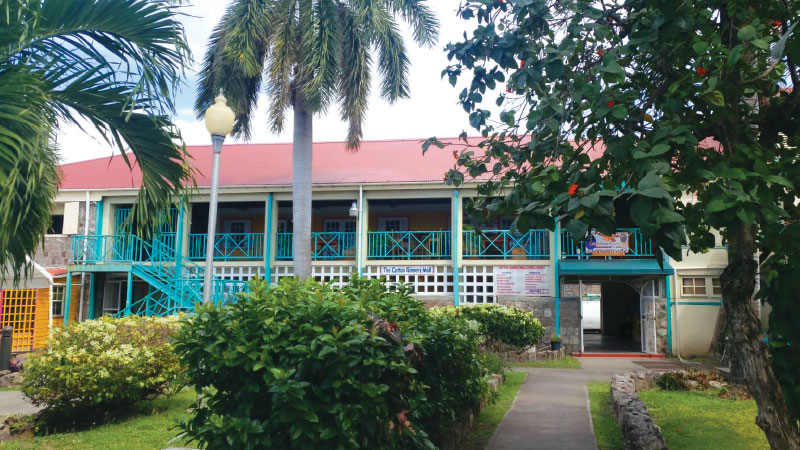By Pamela Diaz
The lush greenery that houses Nevis' historic Cotton Ginnery Mall ... a model for addressing Climate Change.
While climate change is a point of contention internationally, we often listen to the more developed countries discuss the topic before our very eyes. But, in the Caribbean, are we doing our part? Are we doing enough? Can we do more?
The National Aeronautics and Space Administration (NASA) tells us that the planet’s average surface temperature has risen about 1.62°F (0.90°C). They attribute the change to increased carbon dioxide and other human-made emissions into the atmosphere. NASA also revealed that Earth recorded the five warmest years since 2010 with 2016 being the warmest and that the oceans have absorbed much of this increased heat.
Let’s ask the bigger question: what does this have to do with us?
Eldridge Cleaver said it best. “If you are not a part of the solution, you are a part of the problem.”
Cost of Inaction
In 2005, the Caribbean’s cost of inaction on climate change is recorded at 5.0% globally, (Saint Kitts & Nevis will see a 16.0%), as reported in a 2008 study conducted by Ramon Bueno, Cornelia Herzfeld, Elizabeth A. Stanton & Frank Ackerman, entitled The Caribbean and Climate change the costs of inaction.
So, let’s rephrase the question. Are we actually doing our part?
For an island like Nevis that is only 36 square miles, we not only have to be vigilant. We also have to be proactive.
Some of the factors that are concerning to our local port community about climate change include:
• improper disposal of waste from boat, cruise and yacht operators,
• unauthorized anchorage,
• lack of knowledge on the topic; and,
• not enough enforceable regulations to protect and secure the coastline.
In an effort to combat these initial causes, the Nevis Air and Sea Port Authority implemented a series of procedures to address climate change concerns. While we do have a variety of procedures to mitigate climate change on Nevis, we are also aware of areas for improvement.
Police Patrols
An increase in port police patrol of coastal areas proved beneficial amidst growing concerns of our local port community. The police can be a part of a system to secure the area and to enforce existing regulations. Persons found to be in breach of existing climate change regulations would then be held for offences under such regulations. Heftier fines could also be extended to local shops and businesses that do not properly and legally dispose of their waste.
Informational Training Programmes
One of the biggest problems faced at Caribbean ports is the lack of knowledge on climate change as well as the cultural mentality that its only ‘an international problem’ or the thought that ‘what we produce does not contribute to climate change’. The statistics show that this is not the case. But, hosting training sessions for stakeholders in the port industry would contribute significantly to addressing growing concerns about the Caribbean’s contribution to climate change. In this regard, topics such as proper disposal of waste; regulations for boat, cruise and yacht operators; and, unauthorized anchorage would be imperative.
In addition to replacing old lighting fixtures with energy-saving lighting, Nevis has addressed proper collection of waste material from boats, cruise liners and yacht operators. The ports authority has provided mooring stations that regulate an anchorage issue.
The main concern with anchorage was that it destroys the seabed, damage marine life and recreational areas, which impacts not just the environment, but the tourism industry. This was therefore an effort to effectively protect the ocean bed and coral reefs.
Pamela Diaz is the Marketing & Information Manager at Nevis Air & Sea Ports Authority.’

